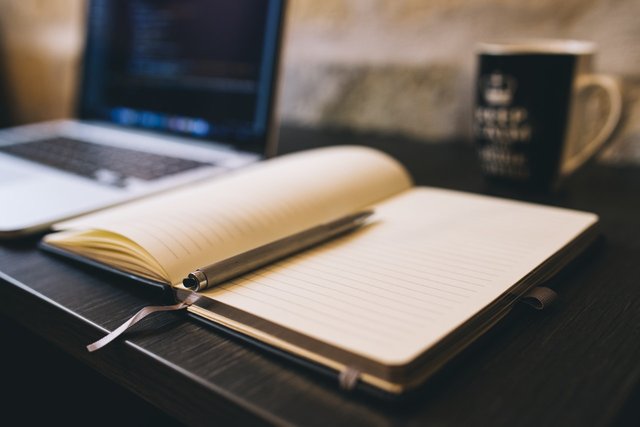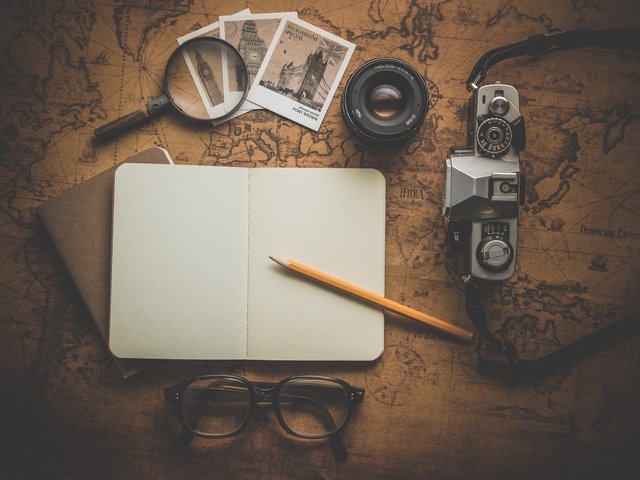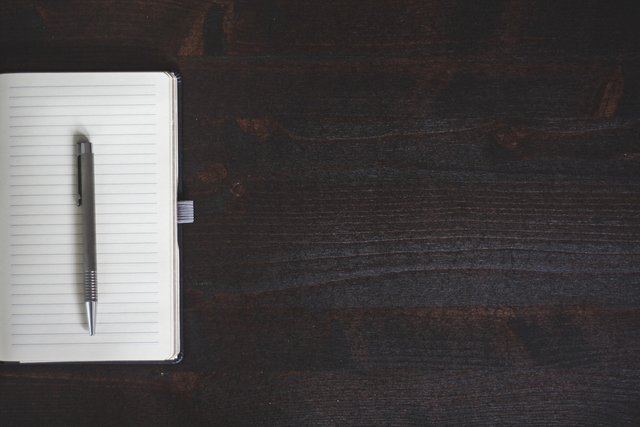On Keeping a Journal as a Creative

We don’t often discuss this, but ideas have to come from somewhere. As creative workers, we like to imagine that they bubble up from the aether, or from the bottom of a gin tonic. If we’re more honest, we discuss ideas in terms of observations, of memories and experiences. But even in that case, the creative process happens somewhere in the back of your mind, behind curtains in a place closed off to us. The best most of us can do is notice where the ideas start, and for many creatives, that place is in the pages of a journal.
I’m not the first one to write about the benefits of keeping a journal: The Art of Manliness had this covered when I was just out of high school. Michael Balchan wrote about his process for morning and evening journaling. In this article, I will discuss the benefits (but not methods, which I cover elsewhere) of journaling from the perspective of a creative professional. I'm a writer as well as a UX designer and creative director at an independent app development studio, so this hits close to home.
Memory (not experience)
I started writing a diary when I was twelve. I realized that I could not remember what I had gotten for my birthday the year before, or the year before that, and everything before age 8 was just a blur of Funfetti cake and Disney soundtracks. That would never do.
My first entries were four or five shaky sentences long: “Today was a normal day. I went to school. Brian was mean, but he said sorry. Had Arby’s for dinner.” And then I signed them ‘-Brooks’ in cursive. But over a few months, my entries became longer and more complicated, until finally, when my grandmother died six months later, I was equipped to describe just how frustrated I was that I wasn’t as sad as I should be. I loved my grandmother, so why were my emotions not in line with my own expectations? Hell, she deserved more than a frown from me.
I even wrote the word “damn,” maybe the strongest word in my writable vocabulary, in a clear cursive.
And here’s the thing: I don’t remember feeling that way at all. Twelve years later, looking through my old journals, I was surprised to see that entry. I remember the sadness, not the confusion.
This is one value of journaling. Your remembering self and your experiencing self are not the same person, as this TED talk by Daniel Kahneman describes. The divide between feeling an emotion in a moment and feeling an emotion about a moment can give you a lot of insight into your own emotional and creative processes. Also, our own experiences after some moment, be they a day, a month, or a year later, can color our memories such that the original feeling is almost totally lost.
Take, for example, a relationship I had for several years. During this time, I wrote regularly about how happy I was with this girl, my plans for our life together, and my general sense of comfort. When the relationship ended, it was easy to fall into the trap of thinking that none of it had mattered. The whole experience was ruined. But of course, that wasn’t true. I had four years of good experiences, and now a negative memory superimposed onto them.
Being aware of this phenomenon can draw your eye to the stories that are going on all around you. From our perspective in the present, our former selves were in the middle of some ridiculous novel, handwritten in green gel pen beneath a clip-on light.
Our past selves were no more aware of the next hundred pages than a fictional character.
As Kahneman says, “the remembering self is a storyteller… What we get to keep from our experiences is a story.” As he continues, Kahneman make the case that we “don’t choose between experiences, we choose between memories of experiences.” In this, I would say that being present, that experiencing every moment, is a valuable tool for anyone, but especially for a creative, which leads me to my next point.

Experience (not memory)
Experience is a sort of attention. As storytellers, writers, or artists, we require a high degree of sensitivity to context. Looking back at my journal entries from elementary school and into middle and high school, I wish I had been more aware of just how bizarre and rarefied my circumstances were. My early entries are covered with words like boring, normal, fine, average, and so on, but I know now just how special and interesting those days really were.
I hope that my entries now, focusing on details of place and people, are more valuable. I often consider a thought experiment: If somehow me-from-the-past were able to meet me-right-now, how how he respond? Bewilderment, for one. I live in Asia, surrounded by people I never thought I would have the chance to meet, living a lifestyle utterly foreign to him. I think he’d be impressed, or perhaps scared. Those details that would trigger some strong emotion in that anxious, frustrated boy are the ones I want to focus on in my journaling.
You’re probably already aware of how writing about your experiences and emotions hones your attention like a razor: you notice smaller things, finding beauty and horror in the mundane. Basically, these are the things that attract that attract us to good writing in the first place. A street corner can be desperate or hopeful, depending on the hour and on who is currently loitering there. The way your friend’s backspace key has been rubbed off from overuse, how dull your pencils are after just a few seconds of drawing, the wristwatch you can’t bring yourself to throw away, the single cup of coffee and cigarette that stand between you and picking a fight with a stranger: these are real, and these are stories.
No matter how good you are, learning to optimize your creative mind for detail can only improve your writing. And honestly, it will improve everything else, too.
And that’s it.

There are other benefits of journaling, of course. It’s relaxing. It’s something to give to your children one day. If you become famous, your biographers will want to read it. But others have written about this, and I’m not interested in marketing the very idea of diaries. Journaling is a tool, a method, and a ritual to aid in creativity. Use it.
So, what stories do you have in your journal? Let me know in the comments!
Nicely written article, i had never always loved the idea of journaling even as a creative but your last paragraph got me rethinking.
Sounds cool to me but i have a bad habit of fIlling empty pages with my signatures and ugly drawings, I dont think that would be a cool gift for my kids or biographers.
You might be surprised. I know that I'd love to have a notebook filled with my parents' doodling.
I keep a journal but I cant say what i write in it here. Very nice and interesting post. The last paragraph is true.
Really enjoyed this post - it made me think about my own journaling. I think some people are able to do this in their mind to the extent that they don't need to write it out. Writers usually need to write their experiences, hopes, desires, struggles, etc. I don't journal - I don't mind a healthy dose of letting memories go - i'm not concerned with what I got two years ago for Christmas. I do write everyday however - and in that writing I can see how things were going at that point in time by what I was writing. I think any type of thoughtful writing - everyday - does a body good. Thanks for the post!
In my view, remembering everything is only half the equation. The other half is seeing how your thoughts and feelings about a time have changed since you were in it.
Thanks so much for the post @wrychime, I'm a bit late to the party but I really enjoyed it.
Journalling is something I used at around the same age as you to just do something to help me process. I would just put things somewhere because I never wanted to forget how things felt.
When I was 12 and 14 I wrote about my first 'break-ups' and difficult experiences at home. More recently in my travelling and work life, I write about what I observe around me and the flow I get in this style is really enjoyable.
More than anything, journalling gives me the place to connect with or pursue my most genuine self; and that's really what I'm obsessed with creating something out of - though I'm very confused about how to go about presenting what I find from there. (practice, i guess).
Thanks do much for your post, I do look forward to what you have to share around different journalling methods. Mine are absolutely still taking shape but from what I've experienced, journalling is an amazing tool in grounding me in what I really want on a daily basis and beyond.